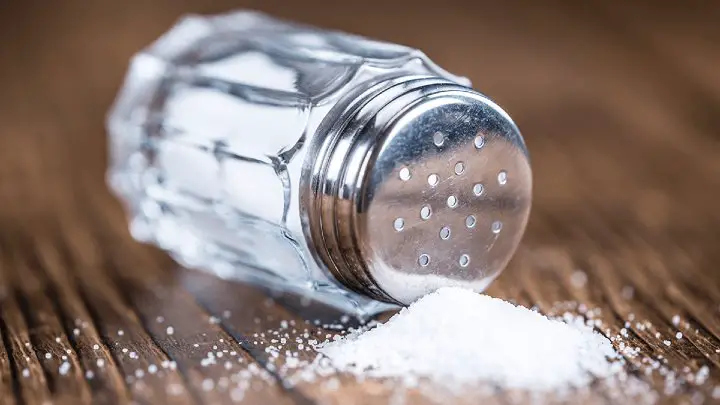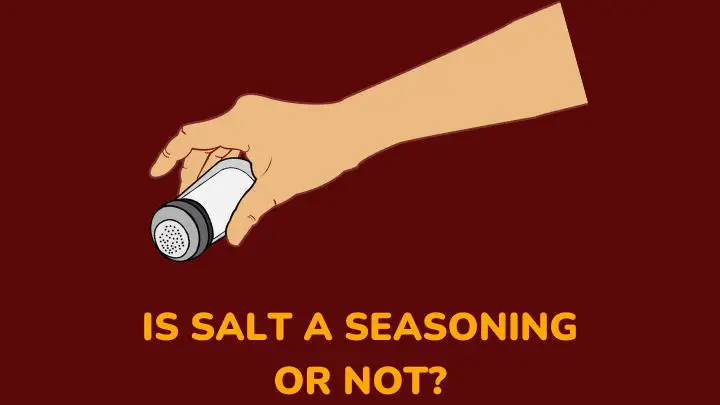Salt is a versatile ingredient. It finds use in almost every recipe and method of cooking. Salt is used to add taste to many dishes, as a preservative, for pickling, etc. The diverse uses of this simple but essential ingredient have many wondering what exactly it is.
People ask if salt is a seasoning or a condiment. Some also ask if it is a spice because it shares the same place as black pepper on the dining table. If you are also wondering about this, don’t feel weird about it. Who wouldn’t?
Well, to help you out, I have put this article together. Ahead, you will learn the ideal definitions of terms like seasoning, condiment, spice, and flavoring. Then, you will know which best describes salt.
Is salt a seasoning?
A seasoning is a substance added to meals to enhance their flavor. There are different definitions for seasoning. However, for this context, a seasoning helps to draw water, enhance the flavor of a meal, and make it more tender.
The role of salt in meals looks exactly like this. It helps to enhance the flavors in your meal and makes it palatable. Therefore, it suffices to call it a seasoning.
Is salt a condiment?
A condiment is any ingredient added to a meal after cooking to enhance its flavor. Mustard, chili sauce, ketchup, meat sauce, and garlic salt are some condiments. Sometimes, salt is added to meals after they are cooked to enhance their flavor.
Salt can be considered a condiment too. Saltshakers are placed on dings for guests to add to their meals if they want to raise the saltiness of the meal.
Is salt a spice?
Spice comes from any part of a plant besides the leaves. They come from the seeds, roots, bark, and twigs of plants. Spices add flavor and aroma to meals. Some examples of spices are pepper, cloves, turmeric, nutmeg, bay leaf, chili, dill, and saffron.
Salt does not add aroma or extra flavor to meals, so salt cannot be considered a spice.
Is salt a flavoring?
Flavoring is an additive that enhances the flavor and taste of a meal. Salt can do this, so it can be called a flavoring.
Is sea salt a seasoning?
Sea salt is also a seasoning. It is commonly used as a substitute for table salt. Sea salt is less processed than regular salt and contains more minerals. It offers more health benefits than table salt.
Is garlic salt a seasoning?
Garlic salt is a seasoning like table salt. This salt adds a garlicky flavor to meats while it imparts the savor.
Benefits of using salt

Improves food flavor
The first and most common reason for using salt is to improve the flavor of your meals. Salt adds a salty flavor to meals and makes them palatable.
Salt also helps to neutralize bitterness in meals. For instance, olives add a bitter taste to meals, but you can counter this by adding salt.
Enhances the texture of a meal
Not many people know this, but salt can help improve the texture of items like meats. Rubbing salt on meat absorbs water from it and texturizes it. Also, adding salt to milk curds helps to draw out whey and make the cheese firmer.
Salt is a preservative
Another popular use of salt is for preserving raw and perishable foods. In ancient times, people used salt to preserve meats, fish, and vegetables like runner beans and cabbage.
It is also used in pickling. Salt absorbs moisture from foods and inhibits the activity of microbes that trigger spoilage.
Salt is hydrating
Consuming salt in moderate amounts helps to hydrate the body. Sodium regulates fluid balance and prevents dehydration, especially during intense physical exercise. Adequate hydration levels help to keep blood pressure stable and prevent certain illnesses.
Improves skin appearance
Salt dissolved in water can help provide relief for dry and itchy skin. Bathing with salt solution can help reduce skin inflammation, increase hydration levels, and decrease roughness.
Good for digestive health
Consuming salt in moderate amounts is good for digestive health. Salt facilitates the transport and absorption of nutrients in the intestines after digestion. You can drink salt water for relief from indigestion.
Natural healing balm
Drinking salt water can help heal canker sores and relieve sore throat. It also provides relief for cold, flue
Side effects of salt
Salt is an essential ingredient. However, excess consumption of salt can be detrimental to health. The side effects can be short-term or long-term, depending on how much salt you have consumed. Some signs of excess consumption of salt are:
Increase in blood pressure
When you have had too much salt, blood will flow through the blood vessels at a higher volume. A major effect of this is an increase in blood pressure which can be a precursor to several severe illnesses.
Hypernatremia
Hypernatremia is a condition of having increased sodium levels. Excessive consumption of salt causes intense thirst, which your body uses to balance its sodium-to-water ratio.
When you urinate a lot in response to increased fluid intake or do not drink enough water, it may result in raised sodium levels.
Symptoms of hypernatremia are frequent urination, difficulty in breathing, restlessness, and poor sleep quality. If left untreated, confusion, seizures, and coma may set in.
Water retention
People who consume a lot of salt experience bloating and swelling in their hands and feet. This is a result of an attempt by the kidneys to maintain a steady sodium-to-water balance. The kidney draws in more water to counter the excessive sodium in the body.
Increased risk of severe diseases
Excessive consumption of salt increases the risk of stomach cancer and heart disease. High amounts of sodium raise blood pressure and stiffen the blood vessels, making it difficult for blood to flow through.
FAQs
Is salt a preservative?
Salt is not originally a preservative but can serve as a preservative. As a hygroscopic substance, it absorbs water from foods, making them dry and unconducive for bacterial growth. You can avoid food spoilage if bacteria do not get adequate moisture to thrive.
Can you use garlic salt instead of table salt?
Garlic salt can be used as a substitute for table salt in recipes that require garlic and salt. It is also a good salt substitute when searing or stir-frying veggies. Ensure you do not add extra salt to your dish and have a salty meal.
What is seasoned salt?
Seasoned salt is a mixture of table salt, herbs, spices, and other flavorings. Some brands of seasoned salt contain monosodium glutamate (MSG). Seasoned salt is used to season fish, chips, chicken, potatoes, and deep-fried seafood.
Conclusion
Based on the descriptions above, you will agree that seasoning and condiment best describe salt and all that it does in meals.
Salt is not a spice but can be a preservative for fresh and perishable food items. Whatever you use salt for in your kitchen, you are getting essential nutrients.
Salt contains sodium and iodine (for iodized salts) which are necessary for healthy body functions and for preventing disorders like goiter. However, watch your salt intake to avoid raising sodium levels.
I also recommend you go through this article to know if garlic salt can be a substitute for garlic powder in your meals.
Thanks for reading.

